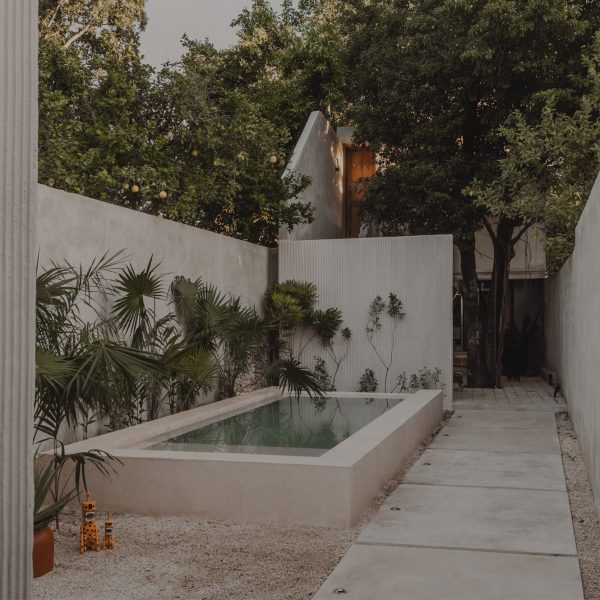[ad_1]
Local architecture practice FMT Estudio has completed two concrete houses on either end of a narrow plot in Mérida, Mexico, connected by a central courtyard.
FMT Estudio designed the El Tirón residential project to have a minimal footprint, aiming to reduce the amount of resources needed in construction while creating a tranquil home.
The studio preserved the existing trees on the site and designed the home’s indoor and outdoor spaces to blend in with the surroundings.
“The project has a minimal architectural footprint on the site, being built to harmoniously integrate into its natural environment and optimise the use of resources,” said FMT Estudio.
“We maintained a focus on environmental conservation and ensured that the architecture yields to the site, rather than the other way around,” the practice continued.
“As a result, the space exudes serenity with minimal expression and materials, providing ample opportunity to contemplate the surrounding exterior views and enjoy the interior space.”
The project is situated on an irregularly-shaped 300-square-metre plot that varies in width from approximately 4.15 metres at its narrowest to five metres at its widest.
FMT Estudio designed a 50-square-metre footprint dwelling at the front of the plot, set back from the street front by a paved car parking space.
Beyond the front dwelling is a courtyard with a 17-square-metre swimming pool, which leads to a 90-square-metre footprint house towards the rear of the site, made up of three separate concrete structures.
FMT Estudio designed the project to have a “continuity and fluidity” that guides visitors through the rectilinear site, with patios built around the site’s existing trees.
The swimming pool in the central courtyard provides a meeting space between the two dwellings.
“The project’s uniqueness lies in its ability to prioritise the needs of the existing context over the construction process, allowing a greater appreciation of the surrounding natural environment,” FMT Estudio told Dezeen.
“The building design has disaggregated the traditional spaces of a house and adapted them to fit seamlessly within the surroundings,” FMT Estudio continued.
“The pool, situated in the sunniest area of the property, acts as a meeting point between the two areas while maintaining them separately.”
The smaller dwelling and the front of the property contains a kitchen and dining area, a double-height living room, and a mezzanine level accommodating a bedroom and bathroom.
A ribbed concrete wall extends from the house to surround an outdoor patio, which connects the house to the central courtyard and pool.
A covered walkway at the site’s entrance provides a route to the house at the rear without having to go through the studio.
The larger rear house has an outdoor patio leading to the kitchen on the ground floor. An outdoor staircase wraps around a tree and leads to a bedroom on the floor above, designed to be a contemplative space with views of the treetop.
Beyond this first rear structure, two additional one-storey structures are separated by courtyards and contain a second bedroom and lounge area.
The outdoor spaces were designed to extend the living areas, providing cross-ventilation and a connection to nature and planting outside.
El Tirón’s foundations were anchored on hewn stone footings that were placed on top of the site’s rocky terrain. Inside, the floors were finished in polished concrete and marble flooring features in the bathrooms.
The interior walls have a polished cement finish, while the exterior walls were coated in a cement-based plaster and painted.
FMT Estudio is an architecture practice based in Mérida, Mexico, that specialises in designing houses in the Yucatán capital.
Other Mexican houses with concrete structures that have recently been published on Dezeen include a beach house with calming water features and a brutalist-style villa with a circular skylight revealing a swimming pool overhead.
The photography is by Zaickz Moz.
[ad_2]

